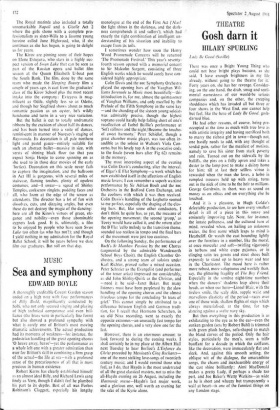Sea and symphony
MUSIC EDWARD BOYLE
A thoroughly creditable Covent Garden season ended on a high note with four performances of Billy Budd, magnificently conducted by Solti, who not only secured singing and playing of high technical competence and even bril- liance (the brass were in particularly fine form) but also showed a profound sympathy with what is surely one of Britten's most moving dramatic achievements. The actual production had its moments of weakness—for instance, the pedestrian handling of the great opening chorus `0 heave away, heave'—yet the performance as a whole left one with a greater admiration than ever for Britten's skill in combining a firm grasp of the actual—the life at sea—with a profound sense of the precariousness of all that is most precious in human existence.
Robert Kerns has clearly established himself as an almost ideal Billy, and Richard Lewis sang finely as Vere, though I didn't feel he plumbed his part to its depths. Best of all was Forbes Robinson's Claggart, especially his lengthy monologue at the end of the First Act (Alas! the light shines in the darkness, and the dark- ness comprehends it and suffers'), which had exactly the right combination of intelligent un- derstanding of his situation and inability to escape from its toils.
I sometimes wonder how soon the Henry Wood Promenade Concerts will be renamed 'The Promenade Festival.' This year's seventy- fourth season opened with a memorial concert to Sir Malcolm Sargent, consisting of three English works which he would surely have con- sidered highly appropriate.
Colin Davis and the BBC Symphony Orchestra played the opening bars of the Vaughan Wil- liams Serenade to Music most beautifully—this introduction is, for me, almost the quintessence of Vaughan Williams, and only excelled by the Prelude of the Fifth Symphony in the same key —and the chording of the sixteen young soloists was admirably precise, though the highest soprano could hardly help falling short of one's recollection of Isobel Baillie's performance at `Soft stillness and the night/Become the touches of sweet harmony.' Peter Schidlof, though a great chamber music player, was too often in- audible as the soloist in Walton's Viola Con- certo, but his lovely top A in the evocative coda to the finale (seven bars after Fig 62) remains in the memory.
The most interesting aspect of the evening was Colin Davis's conducting, after the interval, of Elgar's E Flat Symphony—a work which has now established itself in the affections of English music lovers; I can remember a superb wartime performance by Sir Adrian Boult and the BBC. Orchestra in the Bedford Corn Exchange, and the coolness with which it was then received. Colin Davis's handling of the larghetto seemed to me perfect, especially the shaping of the clos- ing bars. But, like some other conductors, I don't think he quite has, as yet, the measure of the opening movement; the second 'group,' as Tovey would have called it, and the return after the B Flat 'cello melody to the transition theme, sounded too restless in tempo and the final bars of the movement were just too cautious.
On the following Sunday, the performance of Bach's St Matthew Passion by the BBC Chorus (augmented by the admirable Wandsworth School Boys Choir), the English Chamber Or- chestra, and a strong team of soloists under Karl Richter, proved rather a mixed occasion. Peter Schreier as the Evangelist (and performer of the tenor arias) impressed me considerably, a•; did John Shirley-Quirk as the Christus, and —need it be said—Janet Baker. But many listeners must have been perplexed by the slow handling of the opening chorus and the almost frivolous tempo for the concluding 'In tears of grief.' This cannot simply be attributed to a difference between English and German tradi- tion, for I recall that Hermann Scherchen, in an old Nixa recording, went to exactly the opposite extremes—an unusually fast tempo for the opening chorus, and a very slow one for the last.
However, there is an enormous amount to look forward to during the coming weeks. I shall certainly be in my place at the Albert Hall next Tuesday to hear Berlioz's L'Enfance du Christ preceded by Messiaen's Cinq Rechants- one of the most striking love-songs of twentieth century music; and I would remind those who feel, as I do, that Haydn is the most underrated of all the great classical masters, not to miss the all-Haydn evening on 26 August, including the Harmonic messe—Haydn's last major work, and a glorious one, well worth an evening for the sake of the Kyrie alone.






































 Previous page
Previous page